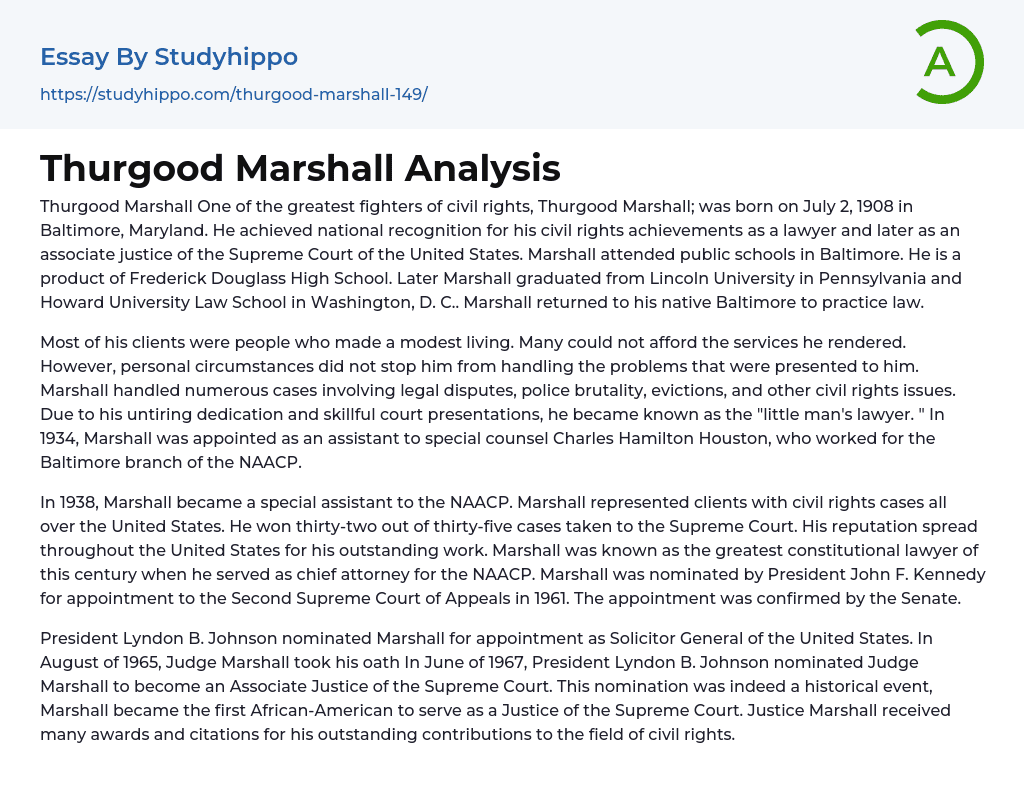Thurgood Marshall, born on July 2, 1908, in Baltimore, Maryland, played a crucial role in the civil rights movement. He gained recognition for his efforts in advancing civil rights as both a lawyer and an associate justice of the Supreme Court of the United States. Marshall received his education at public schools in Baltimore, including Frederick Douglass High School. Following his graduation from Lincoln University in Pennsylvania and Howard University Law School in Washington, D.C., Marshall returned to Baltimore to establish his law practice.
Despite the fact that many of his clients had modest incomes and couldn't afford his services, Marshall didn't reject them. He dealt with different types of cases such as legal disputes, police brutality, evictions, and civil rights matters. His unwavering commitment and effective courtroom presentations earned him the nickname "the little man's
...lawyer." In 1934, Marshall joined the NAACP in Baltimore as an assistant to special counsel Charles Hamilton Houston.
In 1938, Marshall became a special assistant for the NAACP and started advocating for civil rights cases across the US. He had an impressive track record of winning thirty-two out of thirty-five cases he argued before the Supreme Court, establishing himself as the top constitutional lawyer while working as the NAACP's chief attorney. His exceptional work earned him widespread recognition. In 1961, President John F. Kennedy nominated Marshall to serve on the Second Supreme Court of Appeals, and his nomination was later confirmed by the Senate.
President Lyndon B. Johnson appointed Marshall as Solicitor General of the United States, and in August 1965, he officially took his oath as a judge. In June 1967, President Johnson nominated him to become an Associate Justice of
the Supreme Court, making history by becoming the first African-American to hold this position. Justice Marshall's significant contributions to civil rights resulted in numerous awards and citations.
- Business Law essays
- Contract essays
- Consumer Protection essays
- Property essays
- Ownership essays
- Agreement essays
- Common Law essays
- Contract Law essays
- Justice essays
- Security essays
- Tort Law essays
- United States Constitution essays
- Crime essays
- Lawsuit essays
- Treaty essays
- Family Law essays
- Marijuana Legalization essays
- Constitution essays
- War on Drugs essays
- Court essays
- Jury essays
- Police essays
- Protection essays
- Community Policing essays
- Criminal Law essays
- Judge essays
- Lawyer essays
- Employment Law essays
- Copyright Infringement essays
- Injustice essays
- Intellectual Property essays
- Breach Of Contract essays
- Jurisprudence essays
- Social Injustice essays
- Juvenile Justice essays
- Internet Privacy essays
- Cyber Security essays
- Bill Of Rights essays
- Civil Liberties essays
- First Amendment To The United States Constitution essays
- Fourth Amendment To The United States Constitution essays
- Second amendment essays
- Animal Cruelty essays
- Law Enforcement essays
- Juvenile Justice System essays
- Surveillance essays
- Forensic Science essays
- Crime Prevention essays
- Criminal Justice essays
- Criminology essays




